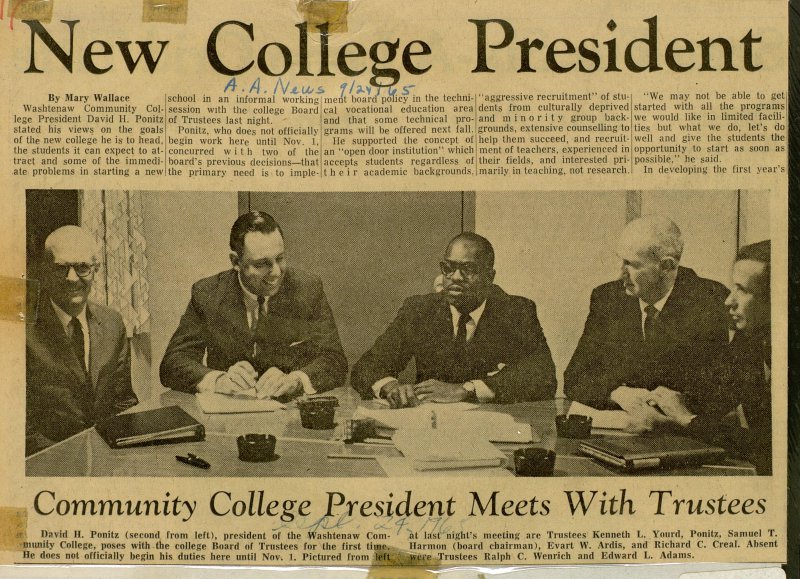New College President Outlines Goal


Washtenaw Community College President David H. Ponitz stated his views on the goals of the new college he is to head, the students it can expect to attract and some of the immediate problems in starting a new school in an informal working session with the college Board i of Trustees last night. Ponitz, who does not officially , begin work here until Nov. 1, concurred with two of the board' s previous decisions- that the primary need is to ment board policy in the techmcal vocational education area and that some têchnical programs will be offered next iall. He supported the concept of an "open door institution" which accepts students regardless of their academie backgrounds, "aggressive reeruitment" of students from culturally cleprived and minority group backgrounds, exlensive counselling to help them succeed, and recruitment of teachers, experienced in their fields, and interested primarily in teaching, not research. "We may not be able to get started with all the programs we would like. in limited 1 ties but what we do, let's do well and give Ihe students the opportunily to start as soon as possible," he said. In developing the first year's courses which will be taught in temporary facilities, the administration will have to determine il' there are some technologies which can be offererl in a day program as well as in evening classes, he said. He stressed the importance oi providing vocational instruction Ion varying levéis encompassing, BJfor example, in electronics, the technician who requires a fuïï two-year education to be able to translate information from the Bory to practicality, and the person who wishes to learn wiring, repair and maintenance of electrical equipment through short courses. The college board should consider the use of citizens advisory groups in determining needBrd curriculum and specifies in leciiipmcn( and facilities, he said. Physicians, engineers and Ifchnicians would be those called on, he said. "We need to look far enough nlicad to prepare students with a broad background so that we don't teach for obsolescence, Ponitz said. He pointed out that some of the nation's high schools have taught hand printing, training their students to be obsolete before they start. Ponitz proposed making cooperative agreements with other community colleges within a reasonable vicinity so that expensive laboratory facilities need not be duplicated. A student desiring a program for which there is not much demand at his local college could be sent to the área college specializing in that field, he said. The need to avoid duplication of laboratories became apparent in his conversations with state vocational education consultants in which he learned that Michigan colleges have requested $42 million this year for technical equipment, and the state appropriation is only $12 million, Ponitz said. Next year the Washtenaw college might receive some reimbursement for salaries of vocational instructors, but not much for equipment, he said. Ponitz and board members agreed that the college would welcome donations of equipment if it is appropriate for teaching purposes and not obsolete. The board would also like to know of buildings that might be available for temporary instruction .space. In recruiting faculty for the vocational courses, Ponitz said he would try to hire persons with technical backgrounds and with experience which they can communicate. " Decisions on what the offerings will be must be made by the first of next year if the college is to get the equipment it will need for fall classes. Eighteen months are required for delivering of data processing equipment, he pointed out. Ponitz agreed with Trustee Kenneth L. Yourd's comment that "offerings will be spotty I to start with and will not - fy all." He added that "wc i, edúcate the students well and a then follow up their performt anee on the job." B Also discussed were arranges ments for cooperative work " study programs, industry financed scholarships and specific training programs for upgrad' ing an industry's workers. Ponitz said that the comraunity college can't accept the responsibility for all training. "It is more interested in educating in the broad spectrum than in training persons to do 3 specific things," he said. The college would hope to help industry with specific rer quests but "education is an t open ended thing and we have -, to put our-money where it wül t do the most good," Ponilz saicl. Ponilz said that the assunpyp,tion that students will flocl 3 industrial and technical couj is false and poses one of the s greatest challenges to the new college. "We will have to develop quickly a program for high school counselors, students and - parents to show what such courses can do for the student," - he said. Those concerned need to know what is a technician, what abilities and skills are needs, and - what are the job opportunities, . the administrator said. ; Asked by Board Chairman Samuel T. Harmon if the col' lege should be open to anyone who can benefit regardless of high school record or cultural background, Ponitz said "the iómmunity college is an open door institution. Sonic stwcl bc ready for lionors and some will need remedia I - lí - " trtionce they are inside we Aspect the students lo be md vated lo do the work and we RJm lake responsibility for heln. ing the student to be successful. We will have problems the lirst year impressing on students what a college is. Many will be first generation college students, the first in their family to enter college, and we must help them in developing their expectations in terms of job orientation and human orientation," the president said. Faculty members will be selected for their interest in teaching instead of involvement in research, and. good academie counselling with one counsellor for every 300 students will be stressed, the president said. Asked by Harmon if he favors "aggressive recruiting" of students from culturally deprived and minority groups, Ponitz replied that he does. But he cautioned that recruiting high school seniors who have never thought of going to college be too late. "We need Lo i earlier with these poten Students," he said, pointing oui fnat studies have shown that a student's goals and attitudes cas be recognized by age eight. "A crash 'program for high school students may benefit some," he said, "but we must start earlier and we need to know what affects the culturally deprived." Ponitz pointed out that 43 per cent of graduating students in 'the county in 1963 went on to post high school education and said that educators have work to do with the schools and parents as well as the students to raise this "low percentage." As a principal and superintendent, Ponitz said he has met parents who consider a college, education a stigma. "We nH models to show kids the future j m terms of job potential and! dollars if you follow a certain IE" ualcl McEwen, a counselor ai Ann Arbor High Sctïool, fine oí three persons in the audience, jKs asked by Harmon whal ld attracl the deprived and minority group students to the college. r The inducements to these 'youths would be "a chance for a better life and the realizations that it is within range, and that others like them have done jil," McEwen said. He said he now is counselling sophomores, 45 per cent of whom i will go to work directly from high school or into service because they do not see anything for them in the immediate future of one or two years or less. Some of these will be directed toward the community college once its programs are known, he said. Ponitz was scheduled to meet with the secondary school cbunsellors from throughout the county today before returning to Freeport, 111., where he remains ' superintendent of schools üntil Nov. 1. Ponitz added that the college will also meet the needs of students returning to school for . general education and those desiring liberal arts education, recognizing that all students do not have technical vocational goals. "The first year will be a pioneer year. Later programs will be broader and changing to meet the needs of the community, and students will know what the college stands for," he said. The new president concluded, "I am here because this appears tot be one of the finest j lenges in education. With the j dividuals on this board, we will be successful." The 1 1/2-hour meeting was attended by trustees, Harmon, Yourd. Richard C. Creal, and Evart W. Ardis.